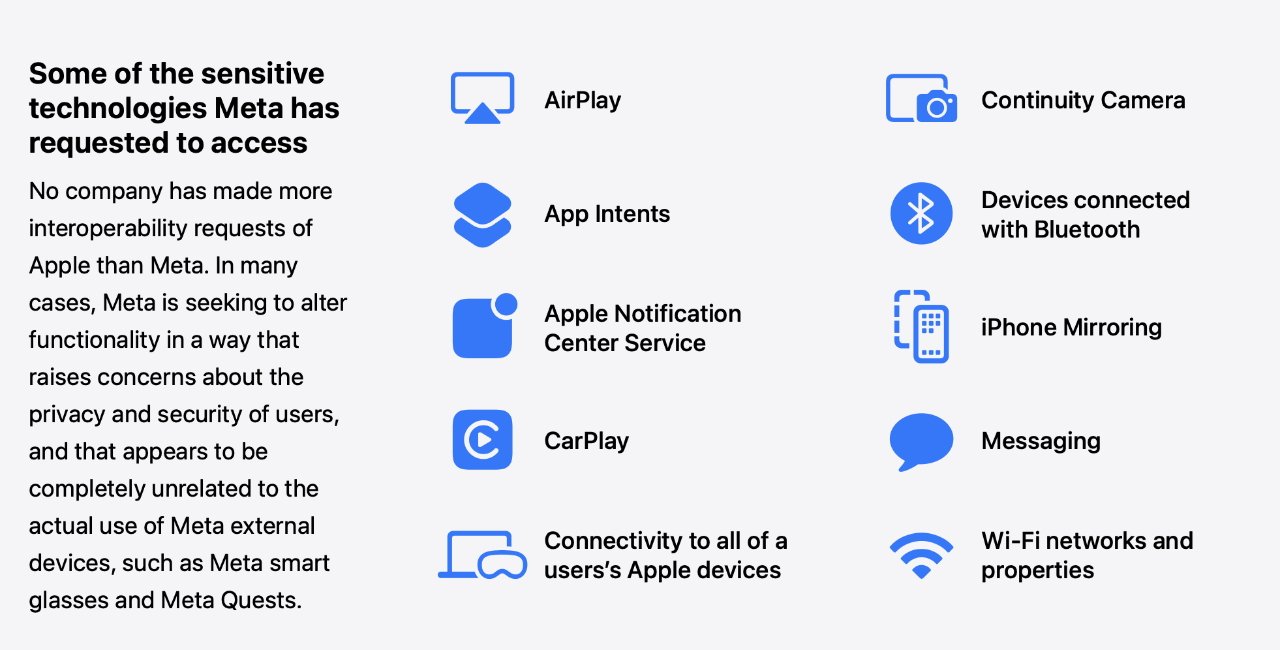Apple has published a white paper that backs the European Union’s policy of interoperability between rival technology firms, but says the law is open to risky interpretation.
In a similar move to its March 2024 raising of security concerns about the Digital Markets Act, Apple has published a white paper about the EU’s interoperability laws. Interoperability is the requirement that Apple share its technology with rivals, so that they can provide users with features such as recording audio through an iPhone‘s microphone.
It follows the EU’s publication of a document asking Apple to change its proprietary technology to be accessible by competitors. Apple’s white paper, called “It’s getting personal“, argues that “abuse of the DMA’s interoperability mandate could expose your private information.”
Apple is being quite particular in saying that it does not disagree with the EU and that it is not criticizing the mandate. What it is saying is that it believes the mandate is open to interpretation, and that gray areas will lead to problems if they are not prevented.
Specifically, its white paper says that Apple receives what it describes as interoperability requests from many firms. If it were required by law to grant all of those requests, it says, there is a risk that firms “may attempt to abuse” the mandate.

Apple is concerned about what Meta has asked it for — image source: Apple
“As an example of our concerns, Meta has made 15 requests (and counting) for potentially far-reaching access to Apple’s technology stack that, if granted as sought, would reduce the protections around personal data that our users have come to expect from their devices,” it says.
Apple then lists all of those 15 requests, which range from iPhone mirroring to “connectivity to all of a user’s Apple devices.” Apple says that in many cases, the requests appear “to be completely unrelated to the actual use of Meta external devices, such as Meta smart glasses and Meta Quests.”
The company says that Meta wants its Facebook, WhatsApp, and Instagram apps to read all messages and emails. Apple says it would mean Meta being able to “see every phone call they make or receive, track every app that they use, scan all of their photos, look at their files and calendar events, log all of their passwords, and more.”
In case that isn’t clear enough, Apple adds a warning that it’s impossible to imagine what the ramifications of the mandate will be.
“For instance, if a user asks Siri to read out loud the latest message received via WhatsApp, Meta or other third parties could indirectly gain access to the contents of the message,” it says. “No one is in a position to understand the full risks of that.”
Apple claims that potentially this DMA mandate could be used as a way for firms to circumvent Europe’s stringent General Data Protection Regulation (GDPR). This is a “strong set of privacy rules… which Apple has always supported.”
What Apple wants to happen next
After then describing the steps it goes through when a company requests interoperability with Apple technology, the company concludes its white paper with a form of mission statement.
“Apple’s high standards for privacy and security are what set us apart,” it says. “Our users depend on it. We want users and developers alike to benefit from the great features and functionalities of iPhone — safely.”
“We will never abandon our bedrock commitment to our users’ privacy and security,” it continues. “We trust that the EC will seek to implement the interoperability requirements in a manner that respects the GDPR.”
Separately, Apple Intelligence was initially delayed in Europe over what appear to be related questions of interoperabilty. It’s not clear yet how this is being resolved, but Apple has committed to Apple Intelligence being available in EU countries and languages including French, Germany, and Italy.





